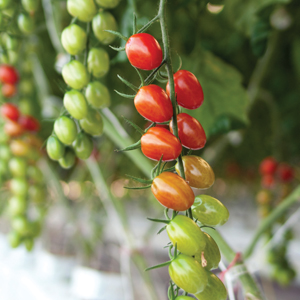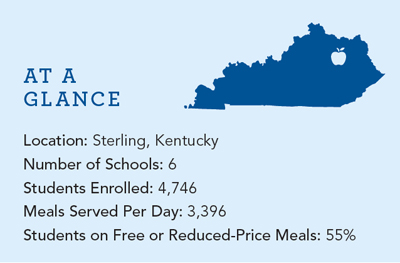Kentucky's Montgomery County Public Schools: A School Food Success Story
The Challenge
Though agriculture plays a key role in Kentucky's economy, traditionally, few school districts have taken advantage of the opportunity to serve produce, dairy, and other locally sourced products to students. In recent years, Montgomery County Public Schools have made considerable progress incorporating foods sourced from the surrounding community. Successfully overcoming a few potential hurdles along the way—including increased cost implications, federal procurement guidelines, and students' acceptance—the district has received several Healthier US School Challenge (HUSSC) gold awards in the process.
Some of the Solutions
A program of the Kentucky Department of Agriculture called Kentucky Proud Restaurant Rewards offers schools incentives for purchasing produce, meat, dairy products, and eggs from local producers. Thanks to reimbursements of 14 to 16 percent of total food costs, the district was able to offer students fresher ingredients at an affordable cost—while also supporting local farmers. This meant that students could eat fresh apples, cantaloupes, tomatoes, watermelon, and more—fruits and vegetables that taste better than produce that has traveled long distances over the course of days or weeks before arriving on students' plates.
Measures of Success
Early on, district leaders recognized the importance of reinforcing lessons about eating healthy, fresh-tasting foods in the curriculum. In one school, cafeteria staff coordinated a display of hydroponic lettuce so that students could see how the roots grow in water. High school students enrolled in a greenhouse class and learned to grow lettuce and cherry tomatoes hydroponically. Since establishing these programs, the district has doubled its lettuce usage.
Nutrition Education
The district's educational initiatives begin at the elementary school level, where students visit local orchards and see firsthand produce that will eventually end up in the cafeteria. The district's philosophy is that if students learn about the seasonality of fresh food—how it is grown and where it comes from—children will feel empowered to make healthier food choices and learn to enjoy eating more fruits and vegetables.
The #1 Lesson Learned
Administrators believe the key to making locally produced foods a major component of the school menu is by building partnerships with local farmers, parents, and others in the community. District leaders plan to work toward strengthening and expanding these partnerships and implementing a newly developed farm-to-school curriculum.
Read more "School Food Success Stories" from school districts across the nation.













